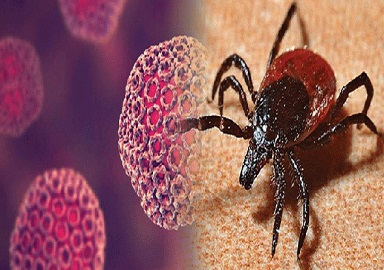BREAKING! South Korea Reports Third Fatality from SFTS Virus In 2024. Experts Warn That Infections Rates Could Rise!
Nikhil Prasad Fact checked by:Thailand Medical News Team Jun 01, 2024 1 year, 8 months, 1 week, 5 days, 23 hours, 42 minutes ago
Medical News: South Korea has reported its third fatality from the tick-borne Severe Fever with Thrombocytopenia Syndrome (SFTS) virus this year, raising concerns among health experts about the rising number of cases. The latest victim, a man in his 50s from Pohang, succumbed to the disease on May 28, 2024, after showing symptoms earlier in the month.
 South Korea Reports Third Fatality from SFTS Virus In 2024.
South Korea Reports Third Fatality from SFTS Virus In 2024.
Experts Warn That Infections Rates Could Rise!
Details of the Recent Case
The deceased, a Pohang resident, began exhibiting symptoms such as fever, hand-wringing, and speech impairment on May 16, following a visit to a grave site in the neighboring South Gyeongsang Province. He was confirmed to have contracted the SFTS virus the next day. Despite receiving intensive care, his condition did not improve, and he passed away after nearly two weeks of treatment.
Current Statistics and Geographic Spread
In the first five months of 2024, South Korea has recorded 12 cases of SFTS, with fatalities occurring in Seoul, Gangwon Province, and now Pohang. This tick-borne disease, first identified in China in 2009, has since spread to Japan and South Korea, causing significant concern due to its high fatality rate and lack of specific antiviral treatments.
Understanding SFTS
SFTS is caused by the Dabie bandavirus, a member of the Bandavirus genus in the Phenuiviridae family, order Bunyavirales. It is primarily transmitted through bites from infected ticks. The disease has an incubation period of five days to two weeks, after which it can cause a range of symptoms including fever, drowsiness, vomiting, diarrhea, and in severe cases, multiple organ failure.
Symptoms and Clinical Presentation
Patients with SFTS often exhibit thrombocytopenia (low platelet count), leukocytopenia (low white blood cell count), gastrointestinal symptoms, and elevated liver enzyme levels. Neurological abnormalities, muscular symptoms, and coagulopathy are also common. Hemophagocytic syndrome, characterized by the body's immune cells attacking its own tissues, frequently accompanies SFTS.
Epidemiology and Historical Context
The virus has been detected in Haemaphysalis longicornis ticks and is believed to involve both arthropod vectors and animal hosts, with humans as accidental hosts. Person-to-person transmission, although rare, has been documented in recent years. Since its initial identification in China, SFTS cases have been reported across 14 Chinese provinces and neighboring countries, including Japan and South Korea.
Preventive Measures and Public Health Response
Given the absence of specific antiviral treatments for SFTS, prevention is crucial. Experts recommend avoiding tick-infested areas, particularly brushy lands with high grass and leaf litter. Public health authorities in South Korea are urging citizens to take precautions, especially during peak tick activity periods from March to November.
Global Impact and Recent Developments
Since its emergence, SFTS has caused significan
t morbidity and mortality in affected regions. Japan reported its first case in 2012, and since then, over 100 cases have been identified, predominantly in western Japan. South Korea has been battling the disease since 2013, with multiple fatalities reported each year. In 2020, an outbreak in East China highlighted the virus's continued threat, with over 60 cases and seven deaths.
Experts also told Thailand
Medical News that both the ticks and also the virus could be evolving due of factors including pressure on the tick natural habitats and host due to climate issues etc
Future Directions and Research
Ongoing research aims to better understand the virus's transmission dynamics, immune response in infected individuals, and potential treatments. Histopathological studies have revealed necrotizing lymphadenitis and cytokine production kinetics, providing insights into the disease's pathophysiology. The virus is believed to have originated 50-150 years ago and has undergone recent population expansion.
Conclusion
The third SFTS-related death in South Korea this year underscores the urgent need for increased awareness and preventive measures. As health authorities continue to monitor and respond to the situation, the public is advised to stay vigilant and avoid areas where tick exposure is likely. The global health community must also intensify research efforts to develop effective treatments and control strategies for this emerging infectious disease.
For more about the SFTS virus, keep on logging to Thailand
Medical News
Read Also:
https://www.thailandmedical.news/news/central-and-south-america-facing-an-oropouche-fever-outbreak
https://www.thailandmedical.news/news/breaking-new-lethal-avian-virus-ampv-b-that-causes-swollen-head-syndrome-has-emerged-in-ontario-canada
https://www.thailandmedical.news/news/scientists-identify-ten-different-viruses-including-emerging-viruses-causing-gastroenteritis-in-children-during-and-after-the-covid-19-pandemic
